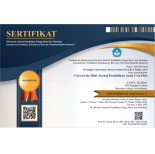Parents' Strategies in Educating the Young Children to Memorize the Qur'an
Abstract
The public interest of Muslim parents in educating their children to memorize the Qur’an seems to be highly large. Educating young children to become Hafiz-ul-Qur’an requires strategies that can support them to truly become Qur'anic memorizers. The aim of this research is to explore the parents’ strategies in educating their young children to become memorizers of the Qur'an. This is a qualitative study which used grounded theory analysis. There were four parents who involved in this study, those parents have been educating their young children to memorize the Qur’an in different backgrounds and domiciles in Indonesia. The conclusion of this study is that there are four strategies parents use in educating their children to memorize the Qur'an. Their strategies in educating the young children to memorize the Qur’an are trying to understand the characteristics of their children, applying habituation toward Al-Qur’an, motivating and giving them rewards, showing good example, consistency and discipline. The implication of this study is to examine in greater depth the strategies parents use in educating their children to become memorizers of the Qur'an. This research explores in depth how the parents’ strategies in educating their young children to memorize the Qur’an.
Keywords
Full Text:
PDFReferences
Abdullah, N. M. S. A. N., Sabbri, F. S. M., and Isa, R. A. M. (2019). Challenges and difficulties in memorizing the Qurʾan in the Tahfiz classes among secondary learners. AL-BURHĀN: Journal of Qurʾān and Sunnah Studies, 3(2), 1-14. https://journals.iium.edu.my/al-burhan/index.php/al-burhan/article/view/138
Anoum, P., Arifa, F., and May, C. (2022). Strategies to increase the motivation of tahfidz Al-Quran. Journal International Inspire Education Technology, 1(2), 74-85. https://doi.org/10.55849/jiiet.v1i2.88
Athiyah, K., and Islam, S. (2019). The innovation of Gabriel Method in improving Al-Qur'an memorization of Islamic elementary school students. Al Ibtida: Jurnal Pendidikan Guru MI, 6(1), 77-89. http://dx.doi.org/10.24235/al.ibtida.snj.v6i1.3814
Ayyad, E. (2022). Re-evaluating early memorization of the Qurʾān in medieval muslim cultures. Religions, 13(2), 179. https://doi.org/10.3390/rel13020179
Batini, F., D’Autilia, B., Pera, E., Lucchetti, L., and Toti, G. (2020). Reading aloud and first language development: A systematic review. Journal of Education and Training Studies, 8(12), 49-68. https://doi.org/10.11114/jets.v8i12.5047
Fadlillah, M., Wahab, R., Ayriza, Y., Rohmah, L., and Ahdhianto, E. (2020). Parenting patterns for developing early childhood multiple intelligences: A Study of phenomenology in Indonesia. Universal Journal of Educational Research, 8(11), 5704-5715. https://doi.org/10.13189/ujer.2020.082204
Fairuzillah, M. N., and Dirgantara, Y. (2024). The advantages of Qur’an memorization toward children’s social-emotional development. Jurnal Obsesi: Jurnal Pendidikan Anak Usia Dini, 8(4), 796-806. https://doi.org/10.31004/obsesi.v8i4.3922
Gulamhusein, T. A., Mwaniki, C., and Koross, P. (2023). Quran memorization and academic achievement: Unveiling the connection. Journal of Popular Education in Africa, 7(8), 132-152. https://kenyasocialscienceforum.wordpress.com/wpcontent/uploads/2023/09/pdf
Heriman, M., dan Mahmudi, M. (2024). Keutamaan membaca Al-Qur’an menurut Al-Qur’an dan hadis. RESLAJ: Religion Education Social Laa Roiba Journal, 6(5), 2429-2437. https://doi.org/10.47467/reslaj.v6i5.1314
Hidayah, A. (2018). Metode tahfidz Al-Qur’an untuk anak usia dini (Kajian atas buku Rahasia Sukses 3 Hafizh Quran Cilik Mengguncang Dunia). Jurnal Studi Ilmu-ilmu Al-Qur'an dan Hadis, 18(1), 51-70. https://doi.org/10.14421/qh.2017.1801-04
Husna, N., Tarmizi, T., and Susanna, S. (2019). The correlation of the ability to memorize the Al-Quran with the results of learning physics. Asian Journal of Science Education, 1(1), 34-39. https://dx.doi.org/10.24815/ajse.v1i1.14348
Huzaery, H., Sumardjoko, B., Kasturi, T., Waston, W., Nirwana, A., and Muthoifin, M. (2024). Enhancing parent-teacher collaboration in tahfidzul Qur’an learning: Roles, challenges, and strategies. International Journal of Religion, 3(10), 3850-3874. https://doi.org/10.61707/jxn48760
Irsal, I. L., and Yunita, N. (2022). The correlation between memorizing the Qur’an ability and students’ logical-mathematical intelligence. Jurnal Pendidikan Matematika (Kudus), 5(2), 255-280. http://dx.doi.org/10.21043/jpmk.v5i2.16586
Islamiah, F., Fridani, L., dan Supena, A. (2019). Konsep pendidikan hafidz Qur’an pada anak usia dini. Jurnal Obsesi: Jurnal Pendidikan Anak Usia Dini, 3(1), 30-38. https://doi.org/10.31004/obsesi.v3i1.132
Karimian, Z., and Hassani, M. (2023). The influence of listening to the holy Quran on maternal and newborn health in Iran: A systematic review. Interdisciplinary Journal of Acute Care, 4(2), 83-91. https://doi.org/10.22087/ijac.2023.502503.1043
Khan, S. N., Ali, H. N., and Mumtaz, M. (2021). Islamic perspective to the responsibilities of parents and teachers towards children’s education in the modern era. Al Khadim Research Journal of Islamic Culture and Civilization, 2(2), 1-12. https://doi.org/10.53575/arjicc.E1-v2.2(21)1-12
Kharomen, A. I. (2019). Kedudukan anak dan relasinya dengan orang tua perspektif Alquran (Perspektif tafsir tematik). Andragogi: Jurnal Diklat Teknis Pendidikan dan Keagamaan, 7(2), 199-214. https://doi.org/10.36052/andragogi.v7i2.88
Kholidin, N., Yuliantoro, A. T., Dewi, T. R., Dewi, S. E. K., dan Oktalina, R. (2024). Hubungan hafalan Al-Qur’an terhadap prestasi belajar siswa sekolah dasar. FASHLUNA: Jurnal Pendidikan Dasar dan Keguruan, 5(2), 84-92. https://doi.org/10.47625/fashluna.v5i2.777
Kurniawati, A., and Muthoifin, M. (2024). Effective Qur'an learning strategies to strengthen children's memorization with Zahrawain method. Solo Universal Journal of Islamic Education and Multiculturalism, 2(01), 37-48. https://doi.org/10.61455/sujiem.v2i01.104
Lubis, A. M., dan Ismet, S. (2019). Metode menghafal Alquran pada anak usia dini di Tahfidz Center Darul Hufadz Kota Padang. Aulad: Journal on Early Childhood, 2(2), 8-14. https://doi.org/10.31004/aulad.v2i2.30
Maharany, I. I., Saputra, D., Febriani, E., and Kumaidi, M. (2024). Roles and responsibilities of parents towards children's education in Islamic perspective. Education Achievement: Journal Of Science and Research, 5(2), 268-277. https://doi.org/10.51178/jsr.v5i2.1839
Majidi, H., and Rajabi-Tavakkol, A. (2025). A systematic review of EEG studies on the neural effects of Quran listening. Iranian Journal of Psychiatry, 20(2), 253-264. https://doi.org/10.18502/ijps.v20i2.18206
Mubiar, M., Mamat, N. B., and Syaodih, E. (2020). Exploring" Kaulinan Barudak" to develop children's character values in Islamic early childhood education. Jurnal Pendidikan Islam, 6(1), 13-26. https://doi.org/10.15575/jpi.v6i1.8226
Muhja, Z. A., Mutmainnah, M., Mustafiyanti, M., Abidin, Z., and Fadil, C. (2023). Correlation between techniques and methods in memorizing the Quran. El-Hekam: Jurnal Studi Keislaman, 8(1), 96-113. http://dx.doi.org/10.31958/jeh.v8i1.9117
Muid, A., and Nasrulloh, N. (2024). The role of education in the formation of character and noble morals from the perspective of the Qur’an. Journal of International Multidisciplinary Research, 2(11), 218-226. https://doi.org/10.62504/jimr992
Nuha, K., and Khoiruddin, A. (2025). Strategy to increase students' interest in memorizing the Qur'an. Civic Engagement and Social Education Journal, 2(2), 79-86. http://journalakasha.com/cesej/article/view/289
Oktarina, A., dan Putro, K. Z. (2021). Pendidikan Quranic parenting pada anak usia dini. JAPRA (Jurnal Pendidikan Raudhatul Athfal), 4(1), 1-22. https://doi.org/10.15575/japra.v4i1.10617
Per-Henrik, G., Anil, V., and Maria, D. (2023). Memorizing the Quran to improve student learning achievement. World Psychology, 2(1), 26-37. https://doi.org/10.55849/wp.v2i1.390
Ramadhan, S., Guswanti, N., Rahayu, E., Zalisman, Z., and Akhyar, Y. (2022). Early childhood tahfizh education: Optimization the aspects of children's development and religious soul of children in the golden age. AL-ISHLAH: Jurnal Pendidikan, 14(2), 2031-2042. https://doi.org/10.35445/alishlah.v14i2.377
Rifa'i, A. (2018). Pendidikan tahfiz anak usia dini (TAUD). Al Qalam: Jurnal Ilmiah Keagamaan dan Kemasyarakatan, 11(23), 113-126. https://www.jurnal.stiq-amuntai.ac.id/index.php/al-qalam/article/view/6/6
Salamah, U. (2018). Pengajaran menggunakan metode Kaisa dalam menghafal Al Quran pada anak. TA'LIMUNA: Jurnal Pendidikan Islam, 7(2), 124-128. https://doi.org/10.32478/talimuna.v7i2.186
Saleh, M. H., Ismail, Z., and Hussin, Z. (2018). Determining the objectives of tahfiz Al-Quran education using Fuzzy Delphi Method (FDM). National Academy of Managerial Staff of Culture and Arts Herald, (1), 621-625. https://www.academia.edu/download/60721435/Tahfiz_Herald20190927-64095-1cepqnv.pdf
Shofwan, I., Raharjo, T. J., Rifai, A., Fakhruddin, F., Sutarto, J., Utsman, U., Arbarini, M., Suminar, T., Mulyono, S. E., Kisworo, B., Malik, A., Yusuf, A., Ilyas, I., Desmawati, L., and Umanailo, C. B. (2019). Non-formal learning strategy based on tahfidz and character in the primary school. International Journal of Scientific & Technology Research, 8(10), 1987-1992. https://www.researchgate.net/profile/Muhamad-Chairul-Basrun-Umanailo/publication/336878110_Non-Formal-Learning-Strategy-Based-On-Tahfidz-And-Character-In-The-Primary-School.pdf
Shukri, N. H. A., Nasir, M. K. M., and Razak, K. A. (2020). Educational strategies on memorizing the Quran: A review of literature. International Journal of Academic Research in Progressive Education & Development, 9(2), 632-648. http://dx.doi.org/10.6007/IJARPED/v9-i2/7649
Soleyadi, M. R. (2024). Concept of reward and punishment and its implementation in education in the modern era: Perspectives from the Quran and hadith. AL-WIJDÃN Journal of Islamic Education Studies, 9(2), 251-265. https://doi.org/10.58788/alwijdn.v9i2.3783
Susianti, C. (2016). Efektivitas metode Talaqqi dalam meningkatkan kemampuan menghafal Al-Qur’an anak usia dini. Tunas Siliwangi: Jurnal Program Studi Pendidikan Guru PAUD STKIP Siliwangi Bandung, 2(1), 1-19. https://www.e-journal.stkipsiliwangi.ac.id/index.php/tunas-siliwangi/article/view/305
Taufikin, T. (2025). Facilitating Qur'anic literacy in early childhood through smart hafiz “Al Qolam”. BOCAH: Borneo Early Childhood Education and Humanity Journal, 4(2), 83-95. https://journal.uinsi.ac.id/index.php/bocah/article/view/10523
Ulum, M., S., dan Ropikoh, I. (2018). Upaya meningkatkan daya ingat anak melalui metode one day one hadits pada anak usia TK: Di Madrasah Baitul Hikmah Naringgul Tegallega Bungbulang Garut. WALADUNA: Jurnal Pendidikan Islam Anak Usia Dini, 1(2), 58-73. https://jurnal.iailm.ac.id/index.php/waladuna/article/view/86
Yuantini, G., dan Kibtiyah, M. (2021). Metode menghafal Al-Qur’an untuk anak usia dini di Rumah Tahfidz Sofwan Salim Palembang. I'tibar: Jurnal Pendidikan Islam Anak Usia Dini, 5(2), 36-49. https://ejournal.iaiqi.ac.id/index.php/itibar/article/view/33
Zaenurrosyid, A., Kahfi, A., and Sholihah, H. (2020). The patterns of memorizing Qur’an for primary school students and the management of pesantren Tahfidz (Study of Madinatul Qur'an Islamic Boarding School in South Java Coast Pati). Santri: Journal of Pesantren and Fiqh Sosial, 1(2), 169-188. https://doi.org/10.35878/santri.v1i2.247
Zaitun, Z., Armita, P., and Saad, M. F. M. (2023). Early children character education: Analysis of the message of the Quran in forming human morality. Afkaruna: Indonesian Interdisciplinary Journal of Islamic Studies, 19(2), 282-297. https://doi.org/10.18196/afkaruna.v19i2.18203
Zuhri, A. (2022). Review of the concept of intercession of the Qur'an on the day of judgement. AL-MANHAJ: Jurnal Hukum dan Pranata Sosial Islam, 4(2), 727-734. https://ejournal.insuriponorogo.ac.id/index.php/almanhaj/article/view/3077
DOI: https://doi.org/10.17509/cd.v16i2.81914
Refbacks
- There are currently no refbacks.
Copyright (c) 2025 UPI Kampus Cibiru

This work is licensed under a Creative Commons Attribution-ShareAlike 4.0 International License.
Cakrawala Dini: Jurnal Pendidikan Anak Usia Dini
Published in collaboration Program Studi PGPAUD UPI Kampus Cibiru, APG PAUD Indonesia, and PPJ PAUD Indonesia

Cakrawala Dini: Jurnal Pendidikan Anak Usia Dini is licensed under a Creative Commons Attribution-ShareAlike 4.0 International License.
Based on a work at https://ejournal.upi.edu/index.php/cakrawaladini.














